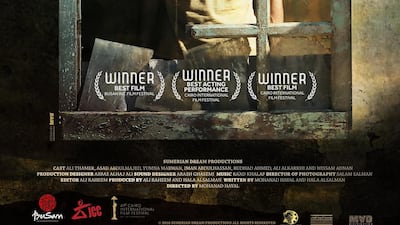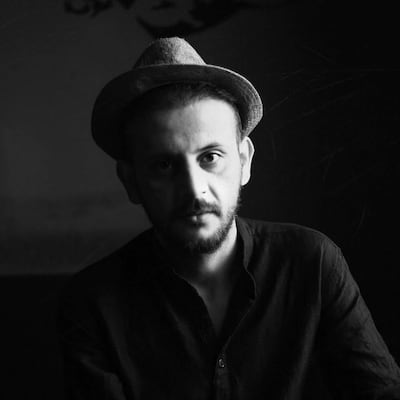It is 2006 and Baghdad is being destroyed by sectarian violence. A 45-year-old translator, Ahmed, arrives at Haifa Street with the intention of proposing to his beloved, Suad. He is a few steps from her building when a sniper fires at his leg and puts him on his back. A passerby lurches forward to help, but the sniper fires a warning shot. He wants Ahmed to bleed to death, alone and in the middle of the street.
From then on, things only get messier and more tragic.
Most of the events in Haifa Street take place between two buildings, with the tension linking them so taut that you need to remind yourself to breathe.
The feature film may be Mohanad Hayal’s first, but it is a masterclass of the “less is more” approach. The dialogue is sparse but sharp. Expository details aren’t magnified, but rather revealed in allusive and organic conversations. The cast – which includes Asad Abdul Majeed, Yumna Marwan, Iman Abdulhassan and Ali Thamer – deliver powerful, memorable performances, divulging more with the emotions they restrain rather than exhibit.
Haifa Street is a family drama more than it is a war film, and it is by no means an easy watch. As far as fiction goes, it is one of the most revealing works on what living in the centre of Baghdad's sectarian conflict was like. And Hayal has experienced that first hand, having worked as a journalist during the war.
“My goal with the film was to make whoever sees it feel the pressures and ambiguities that Iraqis experienced on a daily basis then,” Hayal, who graduated from the University of Baghdad’s College of Fine Arts in 2010, says.
The idea for the film began to form as early as a decade ago, as Hayal was reflecting on the events he faced during the conflict. But it wasn’t until 2014 that he began to seriously work on the script along with Hala Alsalman, an Iraqi-Canadian filmmaker who lives in Los Angeles.
Once the script was finalised, Hayal set his sights on shooting on the real-life Haifa Street “to ensure the realistic nature of the film”. However, the decision brought with it a number of challenges.
It was difficult to convince producers to shoot the film in Iraq, mostly due to the country's capricious circumstances. Filming on Haifa Street also brought challenges because these bridges and streets are in the heart of Baghdad
“It was difficult to convince producers to shoot the film in Iraq, mostly due to the country’s capricious circumstances,” Hayal says. “Filming on Haifa Street also brought challenges because these bridges and streets are in the heart of Baghdad. We had to block the street and it caused traffic.”
Hayal says most of the people who worked on the film also didn’t have prior experience in filmmaking. “Most of them were my friends, the oldest of whom was 24 years old. The budget was slim, so we couldn’t hire professionals.”
These production challenges caused significant delays to filming, a process that took 40 days spread over three years to complete. However, when Haifa Street finally debuted at the Busan International Film Festival in South Korea, in October last year, it was a hit, and scooped the festival's Best Film award.
The movie, which is being distributed regionally by Mad Solutions, premiered in the Arab world at last year’s Cairo International Film Festival, before being shown at the Carthage Film Festival in Tunis and the Rabat International Festival of Auteur Cinema.
It was screening commercially in Cairo when the coronavirus pandemic struck, derailing the film’s screening circuit.
“The film has just resumed showing in cinemas in Tunisia,” Hayal says. “We’re hoping for it to hit cinemas in the rest of the Arab world soon.”
For Hayal, becoming a filmmaker was not a matter of choice, but more like “an existential necessity”. However, being a filmmaker in Iraq isn’t easy as most of the country’s cinematic efforts revolve around glorifying and praising those in power. The emergence of the country’s independent film scene in 2003 has helped inspire change and co-operation with filmmakers from neighbouring countries.
“Still, I think the situation in Iraq, as far as filmmaking and production are concerned, is the worst in the region,” Hayal says. “That’s mostly due to the absence of government support and the lack of private production companies, so it’s quite confined to individual attempts.”
But there's nothing stopping Hayal from making his next piece of work. He has recently finalised the summary for his next film, which is set in 2020 and revolves around an "invisible world" within Baghdad. "I hope to finish the first draft of the script soon," he says. But for now, he says he is looking forward to seeing how Haifa Street is received by audiences in the region.
PROFILE OF SWVL
Started: April 2017
Founders: Mostafa Kandil, Ahmed Sabbah and Mahmoud Nouh
Based: Cairo, Egypt
Sector: transport
Size: 450 employees
Investment: approximately $80 million
Investors include: Dubai’s Beco Capital, US’s Endeavor Catalyst, China’s MSA, Egypt’s Sawari Ventures, Sweden’s Vostok New Ventures, Property Finder CEO Michael Lahyani
Benefits of first-time home buyers' scheme
- Priority access to new homes from participating developers
- Discounts on sales price of off-plan units
- Flexible payment plans from developers
- Mortgages with better interest rates, faster approval times and reduced fees
- DLD registration fee can be paid through banks or credit cards at zero interest rates
Infobox
Western Region Asia Cup Qualifier, Al Amerat, Oman
The two finalists advance to the next stage of qualifying, in Malaysia in August
Results
UAE beat Iran by 10 wickets
Kuwait beat Saudi Arabia by eight wickets
Oman beat Bahrain by nine wickets
Qatar beat Maldives by 106 runs
Monday fixtures
UAE v Kuwait, Iran v Saudi Arabia, Oman v Qatar, Maldives v Bahrain
UAE currency: the story behind the money in your pockets
Key facilities
- Olympic-size swimming pool with a split bulkhead for multi-use configurations, including water polo and 50m/25m training lanes
- Premier League-standard football pitch
- 400m Olympic running track
- NBA-spec basketball court with auditorium
- 600-seat auditorium
- Spaces for historical and cultural exploration
- An elevated football field that doubles as a helipad
- Specialist robotics and science laboratories
- AR and VR-enabled learning centres
- Disruption Lab and Research Centre for developing entrepreneurial skills
COMPANY%20PROFILE
%3Cp%3E%3Cstrong%3EName%3A%20%3C%2Fstrong%3EQureos%0D%3Cbr%3E%3Cstrong%3EBased%3A%20%3C%2Fstrong%3EUAE%0D%3Cbr%3E%3Cstrong%3ELaunch%20year%3A%20%3C%2Fstrong%3E2021%0D%3Cbr%3E%3Cstrong%3ENumber%20of%20employees%3A%20%3C%2Fstrong%3E33%0D%3Cbr%3E%3Cstrong%3ESector%3A%20%3C%2Fstrong%3ESoftware%20and%20technology%0D%3Cbr%3E%3Cstrong%3EFunding%3A%20%3C%2Fstrong%3E%243%20million%0D%3Cbr%3E%3C%2Fp%3E%0A
Keep it fun and engaging
Stuart Ritchie, director of wealth advice at AES International, says children cannot learn something overnight, so it helps to have a fun routine that keeps them engaged and interested.
“I explain to my daughter that the money I draw from an ATM or the money on my bank card doesn’t just magically appear – it’s money I have earned from my job. I show her how this works by giving her little chores around the house so she can earn pocket money,” says Mr Ritchie.
His daughter is allowed to spend half of her pocket money, while the other half goes into a bank account. When this money hits a certain milestone, Mr Ritchie rewards his daughter with a small lump sum.
He also recommends books that teach the importance of money management for children, such as The Squirrel Manifesto by Ric Edelman and Jean Edelman.
Some of Darwish's last words
"They see their tomorrows slipping out of their reach. And though it seems to them that everything outside this reality is heaven, yet they do not want to go to that heaven. They stay, because they are afflicted with hope." - Mahmoud Darwish, to attendees of the Palestine Festival of Literature, 2008
His life in brief: Born in a village near Galilee, he lived in exile for most of his life and started writing poetry after high school. He was arrested several times by Israel for what were deemed to be inciteful poems. Most of his work focused on the love and yearning for his homeland, and he was regarded the Palestinian poet of resistance. Over the course of his life, he published more than 30 poetry collections and books of prose, with his work translated into more than 20 languages. Many of his poems were set to music by Arab composers, most significantly Marcel Khalife. Darwish died on August 9, 2008 after undergoing heart surgery in the United States. He was later buried in Ramallah where a shrine was erected in his honour.
Star%20Wars%3A%20Episode%20I%20%E2%80%93%20The%20Phantom%20Menace
%3Cp%3E%3Cstrong%3EDeveloper%3A%3C%2Fstrong%3E%20Big%20Ape%20Productions%3Cbr%3E%3Cstrong%3EPublisher%3A%3C%2Fstrong%3E%20LucasArts%3Cbr%3E%3Cstrong%3EConsoles%3A%3C%2Fstrong%3E%20PC%2C%20PlayStation%3Cbr%3E%3Cstrong%3ERating%3A%3C%2Fstrong%3E%202%2F5%3C%2Fp%3E%0A
Results
Stage 5:
1. Jonas Vingegaard (DEN) Team Jumbo-Visma 04:19:08
2. Tadej Pogacar (SLO) UAE Team Emirates 00:00:03
3. Adam Yates (GBR) Ineos Grenadiers
4. Sergio Higuita (COL) EF Education-Nippo 00:00:05
5. Joao Almeida (POR) Deceuninck-QuickStep 00:00:06
General Classification:
1. Tadej Pogacar (SLO) UAE Team Emirates 17:09:26
2. Adam Yates (GBR) Ineos Grenadiers 00:00:45
3. Joao Almeida (POR) Deceuninck-QuickStep 00:01:12
4. Chris Harper (AUS) Team Jumbo-Visma 00:01:54
5. Neilson Powless (USA) EF Education-Nippo 00:01:56



